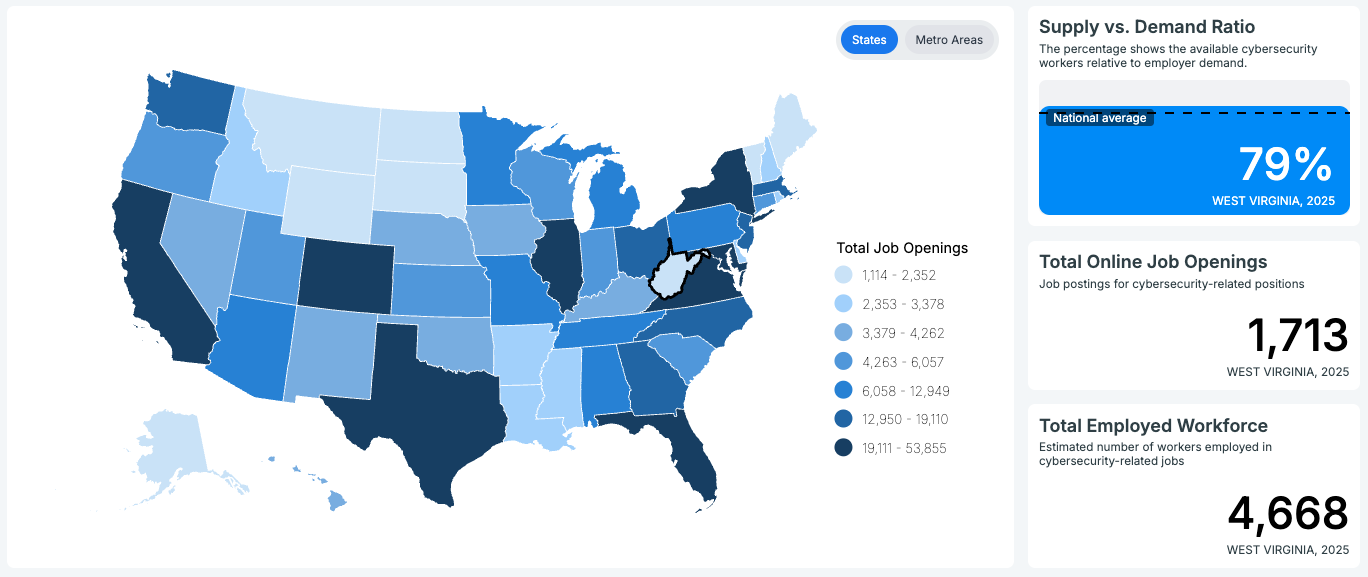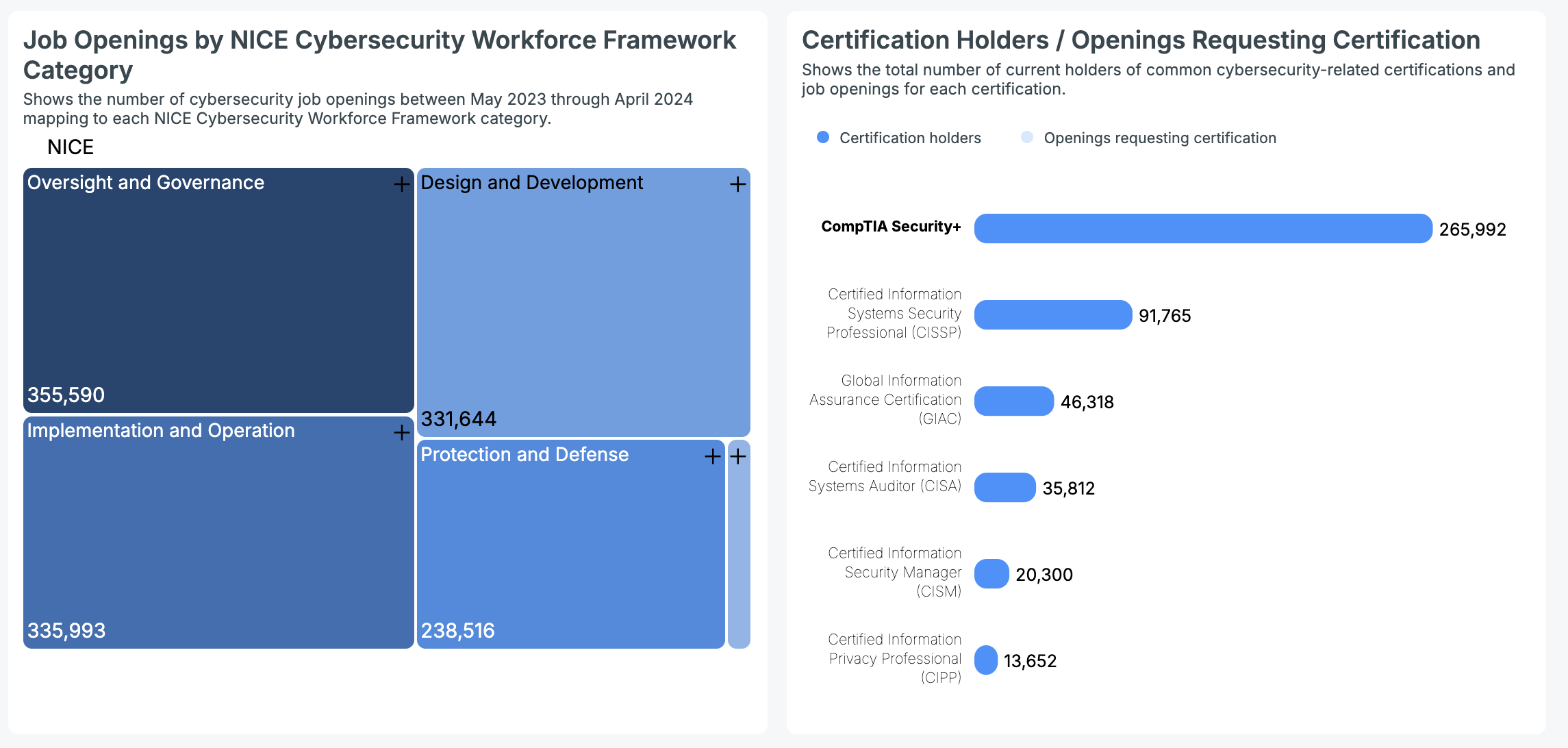- Associate degree
- Bachelor’s degree
- Master’s degree
- Cybersecurity certifications
- Cybersecurity in West Virginia
- Jobs in West Virginia
This guide is about some of the cybersecurity schools in West Virginia. It also includes some of the professional cybersecurity opportunities available in the state.
West Virginia is about a lot more than just coal mining. Natural gas is abundant, and West Virginia is the seventh-largest producer in the United States.
On top of that, in 2018, the state exported roughly $8 billion worth of goods, a 14.2 percent increase in exports over the previous year. If West Virginia were its own country, it would have a higher GDP (Gross Domestic Product) than Panama.
Ad
cybersecurityguide.org is an advertising-supported site. Clicking in this box will show you programs related to your search from schools that compensate us. This compensation does not influence our school rankings, resource guides, or other information published on this site.
Featured Cybersecurity Degree Programs
| School Name | Program | More Info |
|---|---|---|
| Southern New Hampshire University | Online BS in Cybersecurity or Online MS in Cybersecurity | website |
| UC Berkeley School of Information | Master’s in Cybersecurity | No GRE/GMAT Required | website |
| Purdue Global | Online BS in Cybersecurity | website |
| University of Maryland Global Campus | Online Bachelor's in Cybersecurity | website |
| Grand Canyon University | Online BS in Cybersecurity or Online MS in Cybersecurity | website |
When it comes to manufactured products, West Virginia is known for its chemical industry. According to the Office of the United States Trade Representative, West Virginia’s “largest manufacturing export category is chemicals, which accounted for $1.7 billion of West Virginia’s total goods exports in 2018.”
The aerospace industry also plays a pivotal role in West Virginia’s economy. According to the state’s website, “West Virginia manufacturers provide the aerospace industry access to raw materials such as aluminum, alloys, metals, and composites.” Being close to that supply has led Bombardier and Lockheed Martin, among other manufacturers, to open facilities in the state.
From advanced chemical manufacturing to the aerospace industry, West Virginia is home to several cutting-edge production plants and there is a strong demand for the high-tech workers needed to keep them running.

Cybersecurity in West Virginia
Analysis of the U.S. job market from May 2023 to April 2024 reveals substantial nationwide demand within the cybersecurity sector.
Oversight and Governance roles represented the largest segment of openings (355,590). Implementation and Operation positions followed with 335,993, and Design and Development accounted for 331,644. Demand for Protection and Defense roles stood at 238,516, with Investigation roles comprising 19,525.
West Virginia has proven to be quite progressive in its approach to cybersecurity. Rather than just giving it a passing nod, West Virginia’s leading politicians have taken an active interest in promoting what is widely viewed as a critical industry.
For instance, $4.2 million was recently allocated (thanks to the Secure WV Act) to create a “Cybersecurity Office.” The office will be tasked with developing a set of unified cybersecurity policies that will apply to government agencies in the state, as well as enterprises.
Joshua Spence, West Virginia’s Chief Technology Officer, said that the Cybersecurity Office will represent “a foundational step forward in cybersecurity protection of state information systems and data.”
In addition to creating the Cybersecurity Office, the Secure WV Act also mandates that government agencies in West Virginia must “Undergo an appropriate cyber risk assessment as required by the cybersecurity 3 framework or as directed by the Chief Information Security Officer.”
Also, agencies must “Manage a plan of action and milestones based on the findings of the cyber risk 14 assessment and business needs.”
The Secure WV Act is quite comprehensive, and it’s clear that West Virginia believes in a proactive approach to cybersecurity.
While these tough new standards are good for the state, they’re going to leave many agencies scrambling to hire more cybersecurity technicians. That’s good news for anyone considering an education in cybersecurity, especially an in-state degree, as there are many options to choose from.
Cybersecurity organizations in West Virginia
- West Virginia Office of Technology (WVOT): Responsible for setting state cybersecurity policies and protecting governmental digital infrastructure.
- West Virginia Fusion Center (WVFC): A collaboration hub for state, local, and federal agencies to share intelligence on cyber threats and other security issues.
- West Virginia National Guard: Provides cyber defense capabilities and can be activated for state cybersecurity incidents and support.
- Center for Cybersecurity Research and Education (CCRE) at Marshall University: A center at Marshall University focusing on cybersecurity research, education, and training programs.
- Cybersecurity Club at West Virginia University (WVU): An organization for WVU students interested in cybersecurity, offering networking and educational events.
- Robert C. Byrd Institute (RCBI): Offers technology solutions, including cybersecurity for businesses and entrepreneurs.
- West Virginia High Technology Consortium Foundation: Works on developing a high-tech sector in West Virginia that includes cybersecurity initiatives.
- West Virginia Cybersecurity Workforce Alliance: A partnership dedicated to developing the cybersecurity workforce in the state.
- InfraGard West Virginia: The local chapter of a nationwide partnership between the FBI and the private sector focuses on information sharing regarding threats, including those in cyberspace.
- TechConnect West Virginia: Aims to advance technology-based economic development, including the cybersecurity industry.
- West Virginia Higher Education Policy Commission: While not exclusively focused on cybersecurity, they sometimes engage in initiatives that aim to strengthen cybersecurity education and workforce development in the state.
- Discover The Real West Virginia Foundation (DRWV): Facilitates business development in West Virginia, which occasionally includes cybersecurity-related initiatives.
Related resources
Cybersecurity education in West Virginia
West Virginia has invested in cybersecurity education programs at several colleges and universities. These programs provide students with the knowledge and skills to protect computer networks and systems from attack.
One of the most important aspects of cybersecurity education is hands-on experience. Students in cybersecurity programs at West Virginia colleges and universities have the opportunity to participate in simulated cyber attacks and other exercises that help them develop their skills and prepare for the real world.
In addition to academic programs, there are many other opportunities for cybersecurity education in West Virginia. For example, the West Virginia National Guard offers several cybersecurity training courses and workshops. Many private companies offer cybersecurity training and certifications.
Cybersecurity associate degrees in West Virginia
An associate’s degree has the advantage of being inexpensive, and it can be completed in two years. In some cases, credits earned through an associate’s degree may be counted towards a bachelor’s degree.
- Program: A.A.S. in Cyber Security
CAE designation: CAE-CD
Credits: 60
Cost per credit: $181 in-state | $327 out of state
Delivery method: Campus
Learn more: Program details - Program: Associate of Applied Science in Cyber Security and Networking Technology
Credits: 60
Cost per credit: $195 in state | $495 out of state
Delivery method: Campus
Learn more: Program details - Program: Cybersecurity Associate’s Degree – Online
Credits: 65
Cost per credit: $975
Delivery method: Online
Learn more: Program details - Program: A.A.S. in Cyber Security
Credits: 60
Cost per credit: $155 in-state | $496 out of state
Delivery method: Campus & online
Learn more: Program details - Program: Computer Information Systems, A.A.S.
Credits: 60
Cost per credit: $210 in-state | $526 out of state
Delivery method: Campus
Learn more: Program details
Cybersecurity bachelor’s degrees in West Virginia
A majority of cybersecurity jobs require a bachelor’s degree or higher. With four years and 120 credit hours of training, graduates can expect to have a good grasp of cybersecurity fundamentals.
Students may also study other topics like history, English literature, or a foreign language.
- Program: Bachelor of Science in Cybersecurity
Credits: 120
Cost per credit: $325
Delivery method: Online
Learn more: Program details - Program: Computer Science, Cybersecurity Concentration, B.S.
Credits: 120
Cost per credit: $342 in state | $755 out of state
Delivery method: Campus
Learn more: Program details - Program: Bachelor of Science in Digital Forensics and Information Assurance
Credits: 120
Cost per credit: $359 in-state | $820 out-of-state
Delivery method: Campus
Learn more: Program details - Program: Bachelor’s of Science in Cyber Security
Credits: 120
Cost per credit: $380
Delivery method: Online
Learn more: Program details
Cybersecurity master’s degrees in West Virginia
For those hoping for continual advancement throughout their cybersecurity career, a master’s degree may be the right choice.
A master’s program teaches students advanced cybersecurity skills and will prepare them to deal with many different types of cybercrime. Master’s degree holders also earn a higher salary, on average.
- Program: Master of Science in Cybersecurity Studies (MS)
CAE designation: CAE-CD
Credits: 36
Cost per credit: $425
Delivery Method: Online
GRE/GMAT Required: Not Required
Learn more: Program details - Program: Online Master of Science in Cybersecurity
Credits: 30
Cost per credit: $425
Delivery Method: Online
Learn more: Program details

Cybersecurity certifications in West Virginia
Want to know how many cybersecurity pros hold the top certifications across the U.S.? Cyberseek’s data has the answers:
- CompTIA Security+: 265,992 certified
- CISSP: 91,765 certified
- GIAC: 46,318 certified
- CISA: 35,812 certified
- CISM: 20,300 certified
- CIPP: 13,652 certified
Despite having a limited number of higher educational opportunities, West Virginia has a disproportionate number of certification courses, both online and campus-based. These certification programs can increase a student’s skills in a specific niche of cybersecurity.
- Program: Information Security Certificate
CAE designation: CAE-CD
Credits: 30
Cost per credit: $181 in state | $327 out of state
Delivery Method: Campus, Hybrid, Online
Learn more: Program details
Cybersecurity jobs in West Virginia
Cybersecurity is a rapidly growing field, and the demand for qualified professionals is high, including in West Virginia.
As the state becomes more reliant on digital technology, so too does its vulnerability to cyber-attacks.
Anne Barth, the executive director of West Virginia’s TechConnect program, discussed in a meeting of West Virginian cybersecurity leaders. “We were focused on discussing how we can conduct outreach and how we can get the word out to students about these possibilities and how we can get them enrolled in various programs at educational institutions around the state.”
Here are some of the most common jobs in West Virginia:
- Security Analyst
- Network Engineer
- System Administrator
- Security Engineer
- Information Security Officer (ISO)
The Bureau of Labor Statistics reported that security analysts in West Virginia were earning an average hourly wage of $51.84, and the average annual salary was $107,820.
Currently, there are 4,668 cybersecurity professionals employed in West Virginia from May 2023 through April 2024, and there were also 1,713 new cybersecurity job openings published according to CyberSeek.
Cybersecurity in West Virginia
Although cybersecurity awareness is increasing across the nation, the focus on this important industry is especially pronounced in West Virginia.
From the highest levels of government on down, the state has shown a commitment to strong security and the prevention of cybercrime.
One of the results of West Virginia’s cybersecurity focus is a large number of educational opportunities, especially certification programs, of which the state has many.
Those educational opportunities, and the above-average salary promised by cybersecurity work, will not go unnoticed for long, however. The next generation is poised to look for work in the IT industry, and that means increased competition down the line.
That’s helpful for West Virginia’s various high-tech industries, as there will be more qualified IT technicians to staff job vacancies. However, for potential students, it means now is the time to start thinking about a career in cybersecurity.